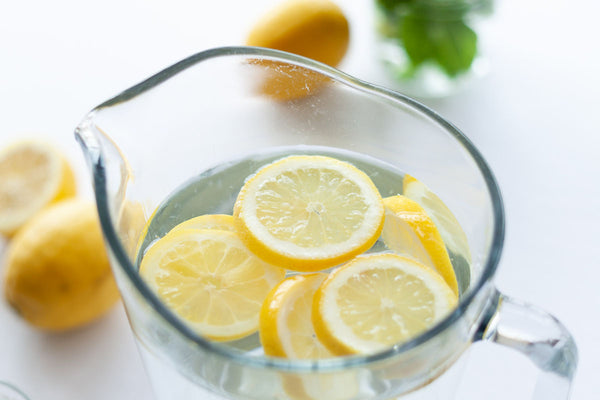The weight loss industry is filled with lots of gimmicks, fads, and flat-out bad information.
One recent example of this is the surge in popularity of lemon water.
Lemon water is sold as some kind of magic elixir or tonic that purifies the body, eliminates toxins, and burns fat.
But, is there any truth to these claims?
Let’s find out.
What is Lemon Water?
Lemon water is a beverage made by combining water with fresh-squeezed lemon juice. It can be enjoyed either hot or cold.
Though, if you’re looking to preserve the micronutrients naturally occurring in lemon juice (e.g. vitamin C), you’ll want to drink your serving of lemon water either cold or room temperature as very hot water can kill some of the heat-sensitive micronutrients found in lemon juice
Why Do People Drink Lemon Water?
People are told to drink lemon water for a variety of reasons including:
- Increased energy
- Improved digestion
- Greater mental focus & clarity
- Accelerate weight loss
Why Lemon Water Helps Lose Weight
We’ll set the record straight from the get-go regarding lemon water and its effects on weight loss.
Lemon water can support dieting and weight loss, but it’s not through some magical “detoxification” of your body or mystical properties of lemon juice.
The reasons lemon water helps you lose weight are...
Lemon Water Is Low in Calories
Lemon water contains virtually no calories.
Operating under the assumption that you squeeze a slice or two of lemon into a standard 8-oz glass of water, each glass of lemon water will contain a mere six calories.
Also, realize that lemon water is not the same thing as lemonade.
Lemonade does have lemon in it, but it also has lots of sugar as well.
Lemon water is simply a lemon slice or two squeezed into a glass of water -- no sugar, no syrup, no sweetener.
By swapping more lemon water into your diet and removing other sources of calorie-containing liquids from your diet (soda, fruit juice, smoothies, gourmet coffees, etc), you’re reducing your overall calorie intake, which supports weight loss.
To put the calorie difference in perspective, consider this:
- 8-ounces of orange juice contains 110 calories (including 21 grams of sugar)
- A 12-ounce can of soda includes 140 calories and 39 grams of sugar!
- A 16-ounce mocha frappuccino contains 370 calories, 15 grams of fat, and 55 grams of sugar!
Replacing just one of these drinks each day with a glass or two of lemon water decreases your daily calorie intake between 100–300 calories.
Over the course of weeks and months, this adds up to BIG savings on energy intake, which enhances dieting and weight loss.
Supports a Healthy Metabolism
Water is involved in just about every function of the human body, including your metabolism.
What this means is that if you are dehydrated, your metabolism may not be running as it should be.
Research shows that drinking water can marginally boost metabolism by inducing thermogenesis.
More specifically, a small study found that drinking ~16oz of water boosts metabolism by 30% in the ensuing 30–40 minutes post-drinking.[1]
Because water is the primary ingredient in lemon water, it’s likely these results would translate.
Increases Feelings of Fullness
One of the easiest, most effective, and affordable appetite suppressants you can do is something called a water “preload.”
Basically, 20-30 minutes before you eat, drink 16 ounces of water.
Research shows that drinking 0.5 liters (~16 oz) of water before a meal reduces calories eaten at that meal by 13%.[2]
Additional research notes that drinking water during mealtime can decrease hunger and increase satiety.[3]
Since lemon water is very low in calories and can enhance fullness similar to drinking regular water, it can be an effective and low-cost way to help reduce calorie intake.
It Enhances Hydration
Our bodies are made of approximately 60% water, and water is used for just about every biological process that occurs in the body from delivering essential nutrients to cells to eliminating waste from the body. It also plays a key role in regulating core body temperature.
As such, drinking enough water to maintaining hydration is essential to overall health and peak physical performance.[4]
Some research indicates that adequate hydration promotes the breakdown of fats and encourages weight loss loss.[5]
Furthermore, adequate hydration also helps reduce water retention, thereby reducing signs of bloating, puffiness, and water weight.[6]
Since lemon water is 99.9% water, it stands to reason that drinking it improves hydration.
Encourages Weight Loss
Due to the positive effects drinking water can have on hydration, satiety, and metabolism, satiety, and hydration, it’s perfectly logical to assume that drinking water helps weight loss.
And, research confirms this, too!
A study in adults comparing two low-calorie diets found that the group doing a water “preload” before each meal lost 44% more weight than participants in the low-calorie diet group who did not perform a water “preload”.[7]
Another study in overweight females found that higher water intake was independently associated with increased weight loss, meaning individuals who drank more water lost more weight without having to exercise more.[8]
Is Lemon Water Better Than Regular Water?
Lemon water does contain some beneficial micronutrients that are not found in plain water, such as vitamin C and antioxidants.
However, this low level of micronutrients will not lead to any dramatic differences in weight loss that would be had if you just consumed plain water.
Furthermore, any talk of lemon juice having an “alkalizing” effect on the body and accelerating weight loss or “purifying” the body are not supported by science.
There is some evidence suggesting that lemon water may help prevent kidney stones, due to the acids naturally occurring in it.[9,10]
The bottom line here is that lemon water is not inherently “healthier” for you or superior for weight loss compared to plain water.
However, if drinking lemon water leads you to drink more water during the day (if for instance, you don’t like the taste of plain water), then you could say it’s “better”, but not by any magic benefits of lemon itself.
The Bottom Line on Lemon Water & Weight Loss
Lemon water is a low-calorie beverage that may promote fullness, support hydration, boost metabolism and encourage weight loss.
It is NOT better than regular water when it comes to supporting health & wellness or losing fat.
But, if drinking flavored water (such as lemon water or lime water) helps you consume more fluids during the day and replace other higher-calorie beverages, it can be effective for improving health and promoting weight loss.
References
- Boschmann, M., Steiniger, J., Hille, U., Tank, J., Adams, F., Sharma, A. M., Jordan, J. (2003). Water-induced thermogenesis. The Journal of Clinical Endocrinology and Metabolism, 88(12), 6015–6019. https://doi.org/10.1210/jc.2003-030780
- Davy BM, Dennis EA, Dengo AL, Wilson KL, Davy KP. Water consumption reduces energy intake at a breakfast meal in obese older adults. J Am Diet Assoc. 2008;108(7):1236–1239. doi:10.1016/j.jada.2008.04.013
- Lappalainen, R., Mennen, L., van Weert, L., & Mykkanen, H. (1993). Drinking water with a meal: a simple method of coping with feelings of hunger, satiety and desire to eat. European Journal of Clinical Nutrition, 47(11), 815–819.
- Popkin BM, D'Anci KE, Rosenberg IH. Water, hydration, and health. Nutr Rev. 2010;68(8):439–458. doi:10.1111/j.1753-4887.2010.00304.x
- Thornton SN. Increased Hydration Can Be Associated with Weight Loss. Front Nutr. 2016;3:18. Published 2016 Jun 10. doi:10.3389/fnut.2016.00018
- Negoianu, D., & Goldfarb, S. (2008). Just Add Water. Journal of the American Society of Nephrology, 19(6), 1041 LP – 1043. https://doi.org/10.1681/ASN.2008030274
- Dennis EA, Dengo AL, Comber DL, et al. Water consumption increases weight loss during a hypocaloric diet intervention in middle-aged and older adults. Obesity (Silver Spring). 2010;18(2):300–307. doi:10.1038/oby.2009.235
- Stookey, J. D., Constant, F., Popkin, B. M., & Gardner, C. D. (2008). Drinking water is associated with weight loss in overweight dieting women independent of diet and activity. Obesity (Silver Spring, Md.), 16(11), 2481–2488. https://doi.org/10.1038/oby.2008.409
- Aras, B., Kalfazade, N., Tugcu, V., Kemahli, E., Ozbay, B., Polat, H., & Tasci, A. I. (2008). Can lemon juice be an alternative to potassium citrate in the treatment of urinary calcium stones in patients with hypocitraturia? A prospective randomized study. Urological Research, 36(6), 313–317. https://doi.org/10.1007/s00240-008-0152-6
- Kang, D. E., Sur, R. L., Haleblian, G. E., Fitzsimons, N. J., Borawski, K. M., & Preminger, G. M. (2007). Long-term lemonade based dietary manipulation in patients with hypocitraturic nephrolithiasis. The Journal of Urology, 177(4), 1358–1362; discussion 1362; quiz 1591. https://doi.org/10.1016/j.juro.2006.11.058





